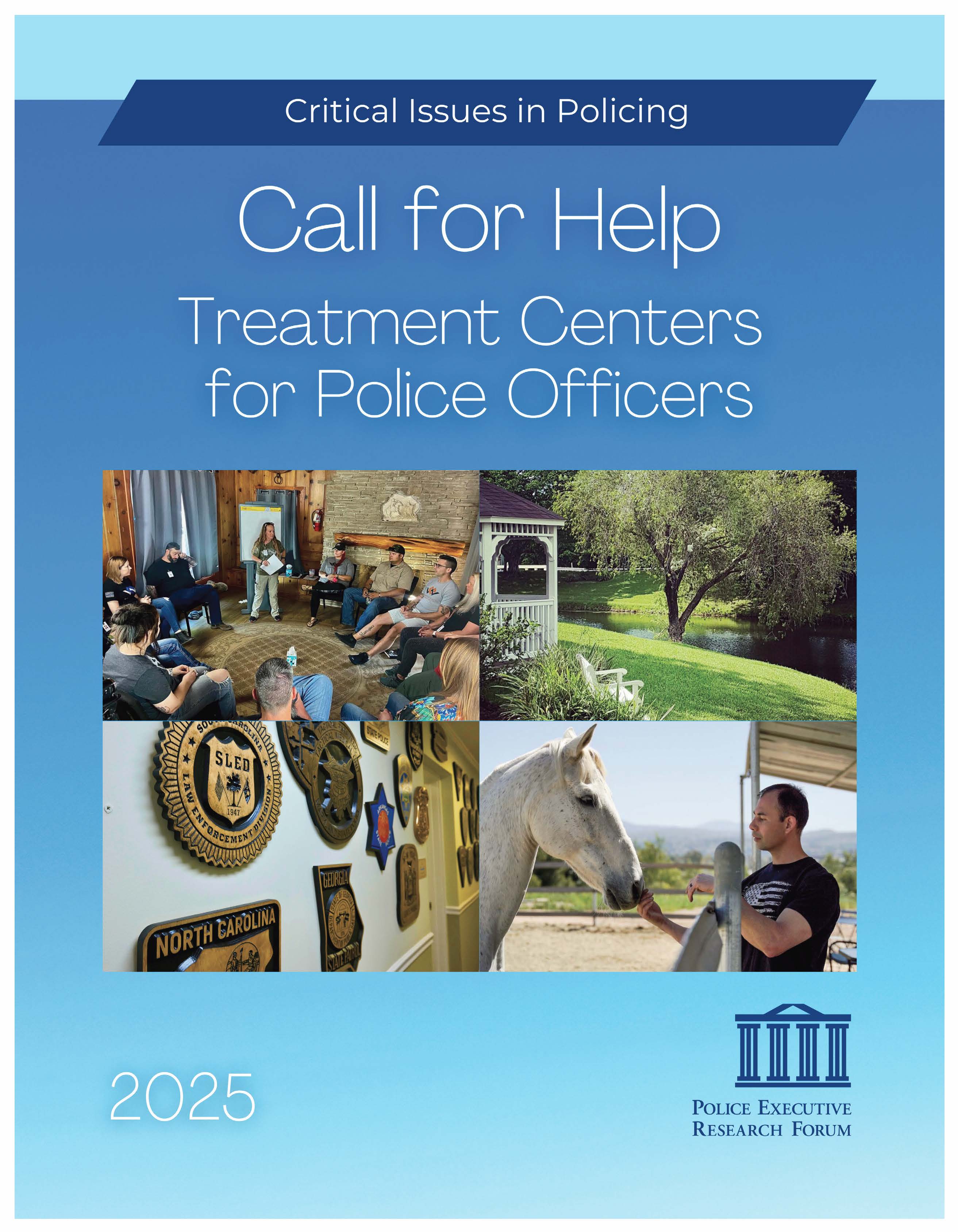|
March 29, 2025 New PERF report on mental health treatment centers for police
PERF members, The Centers for Disease Control and Prevention (CDC) reports that “the United States is in mental health crisis,” and that crisis includes the policing profession. As I wrote to you in the March 15 edition of Trending, a new study in the Journal of Police and Criminal Psychology by researchers Kathleen Padilla from Texas State University and Daniel Lawrence and Jessica Dockstader from the CNA Corporation surveyed nearly 900 law enforcement employees from eight agencies about their mental health. The study’s findings accentuate the crisis:
The Federal Bureau of Investigation consistently reports that “law enforcement officers face a higher risk of death by suicide than of being killed in the line of duty.” And according to Police1’s “What Cops Want in 2024” survey, “79 [percent] reported that there is significant stigma surrounding seeking mental wellness support.”
PERF visited five of the six residential treatment centers the National FOP Division of Wellness Services has vetted and approved as culturally competent to treat law enforcement personnel: (1) Chateau Recovery in Midway, Utah; (2) First Responder Wellness in Newport Beach, California; (3) Harbor of Grace Recovery Centerin Havre de Grace, Maryland; (4) Shatterproof at FHE Health in Deerfield Beach, Florida; (5) Throttle & Thrive in Palos Verdes Estates, California; and (6) Warriors Heart in Bandera, Texas, and Milford, Virginia. A culturally competent treatment program “addresses the unique stressors, triggers, and experiences that first responders face” and “aligns with first responders’ culture, code, and values.” The FOP does not approve treatment centers unless they are able to demonstrate the cultural competency of the centers’ staff. Sherri Martin, Director of the FOP’s Division of Wellness Services, is uncompromising on this issue: “The FOP doesn't want to send personnel somewhere that hasn't been fully vetted,” she says. Collectively, these six facilities have treated more than 10,000 first responders and military personnel. The first responders come from all 50 states and serve in agencies of various sizes at the local, state, and federal levels. Among the first responder clients are police officers of all ranks and titles, including police chiefs.
A map at Harbor of Grace Recovery Center showing the locations of past clients. Although there are other facilities that specialize in treating first responders, the National FOP Division of Wellness Services has vetted and approved the six featured in this report to ensure police officers receive the best care possible when stress, anxiety, trauma, substance misuse, and inadequate coping skills require a level of treatment an outpatient setting cannot provide. Because of the comprehensive vetting and approval process, chiefs and sheriffs can be confident the treatment centers will deliver what officers desire most: anonymity, ease of access, cultural competency, and quality care. This report explains what it is like to be a client at one of these centers, including pre-admission and intervention, transportation, admission and intake, detoxification, confidentiality, payment, use of cell phones, lodging, meals, family involvement, staff, treatment modalities, and aftercare plans. The report also provides police leaders with eight recommendations for how they can support officers and deputies when they return from treatment and how they can promote an organizational culture of officer safety and wellness. These experiences and recommendations are brought to life through profiles of 10 officers and deputies who received care at the treatment centers. Their stories speak to the quality of care the treatment centers provide. “I didn’t know such places existed” should be a statement of the past. Although stigma is still a significant barrier to treatment, there are signs that the tightly woven culture of silence—the one that says police officers will lose their job if they ask for help—is starting to unravel. In its place, today’s police leaders can boldly weave a new culture of openness and honesty, where trauma and its effects are normalized and seeking professional help is expected. In the words of Dr. Cherylynn Lee, a Santa Barbara County (California) Sheriff’s Office Behavioral Sciences Manager who PERF interviewed for this report, “It’s okay not to be okay, but it’s not okay to stay that way!” This is the 52nd report in PERF’s Critical Issues in Policing series, which is supported by the Motorola Solutions Foundation. I’m grateful to the many PERF staff members who contributed to this project, a team led by Senior Principal Martin Bartness. And this work wouldn’t have been possible without the support of Director Sherri Martin at the National FOP Division of Wellness Services, the outstanding professionals at the residential treatment centers highlighted in this report, and the courageous current and former officers who graciously shared their stories of recovery. I hope this report can serve as an invaluable resource to help officers and deputies get the help they need. Best, Chuck |


